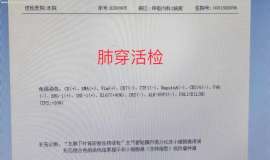马дёҠжіЁеҶҢпјҢз»“дәӨжӣҙеӨҡеҘҪеҸӢпјҢдә«з”ЁжӣҙеӨҡеҠҹиғҪпјҢи®©дҪ иҪ»жқҫзҺ©иҪ¬зӨҫеҢәгҖӮ
жӮЁйңҖиҰҒ зҷ»еҪ• жүҚеҸҜд»ҘдёӢиҪҪжҲ–жҹҘзңӢпјҢжІЎжңүиҙҰеҸ·пјҹз«ӢеҚіжіЁеҶҢ

x
1жңҲ14ж—Ҙж¶ҲжҒҜ - зҺҜзҗғеҢ»еӯҰжҚ®жӮүпјҢдёҖйЎ№иҚ·е…°зҡ„з ”з©¶иЎЁжҳҺпјҢеҪ“жӮЈжңүKRASеҹәеӣ зӘҒеҸҳзҡ„йқһе°Ҹз»ҶиғһиӮәзҷҢпјҲNSCLCпјүжӮЈиҖ…жҺҘеҸ—йқ¶еҗ‘иҚҜзү©зҙўжӢүйқһе°јпјҲеӨҡеҗүзҫҺпјүжІ»з–—ж—¶пјҢи¶…иҝҮдёҖеҚҠзҡ„жӮЈиҖ…еҜ№жІ»з–—жңүйғЁеҲҶеҸҚеә”жҲ–з—…жғ…еҫ—д»ҘзЁіе®ҡгҖӮ
жҖ»дҪ“иҖҢиЁҖпјҢеңЁжҺҘеҸ—еӨҡжҝҖй…¶жҠ‘еҲ¶еүӮжІ»з–—жңҹй—ҙпјҢ57дҫӢжӮЈиҖ…дёӯжңү30дҫӢпјҲ53пј…пјүжӮЈиҖ…зҡ„з—…жғ…иҮіе°‘еңЁ6е‘ЁеҶ…жңӘеҸ‘з”ҹжҒ¶еҢ–гҖӮжӮЈиҖ…зҡ„дёӯдҪҚж— иҝӣеұ•з”ҹеӯҳжңҹпјҲPFSпјүдёә2.3дёӘжңҲпјҢиҖҢе…¶дёӯдҪҚжҖ»з”ҹеӯҳжңҹдёә5.3дёӘжңҲгҖӮ
вҖңзҙўжӢүйқһе°јеңЁеҸ‘з”ҹдәҶKRASеҹәеӣ зӘҒеҸҳзҡ„жӮЈиҖ…иә«дёҠжҳҫзӨәеҮәдәҶзӣёе…ідёҙеәҠжҙ»жҖ§пјҢиҖҢдё”жңүеҝ…иҰҒиҝӣдёҖжӯҘеҜ№иҜҘиҚҜзү©иҝӣиЎҢдёҙеәҠи°ғжҹҘпјҢвҖқйҳҝе§Ҷж–Ҝзү№дё№VUеӨ§еӯҰеҢ»еӯҰдёӯеҝғзҡ„еҢ»еӯҰеҚҡеЈ«Wouter W. MellemaеңЁиӮәзҷҢеҲҶеӯҗиө·жәҗиҒ”еҗҲдјҡи®®дёҠиҜҙгҖӮ
然иҖҢпјҢMellemaеңЁдјҡдёҠеҸ‘еёғзҡ„дёҖд»Ҫж–°й—»зЁҝдёӯжҸҸиҝ°дәҶдёҚиғҪд»Өдәәж»Ўж„Ҹз»“жһңгҖӮIIжңҹдёҙеәҠиҜ•йӘҢзҡ„з»“жһңдёҺIжңҹз ”з©¶зҡ„з»“жһңдёҚз¬ҰпјҢиҜҘIжңҹз ”з©¶жҳҫзӨәпјҢ3дҫӢжӮЈиҖ…еҜ№жІ»з–—жңүйғЁеҲҶеҸҚеә”пјҢ5дҫӢжңүиҪ»еҫ®еҸҚеә”пјҢиҖҢ10дҫӢжӮЈжңүKRASеҹәеӣ йҳіжҖ§NSCLCзҡ„жӮЈиҖ…зҡ„дёӯдҪҚPFSдёә3.0дёӘжңҲпјҲThorac Oncol 2010; 5: 719-720пјүгҖӮ
вҖңжҲ‘们预计пјҢ[еңЁIIжңҹз ”з©¶дёӯ]ж— иҝӣеұ•з”ҹеӯҳжңҹе’ҢжҖ»з”ҹеӯҳжңҹе°ҶдјҡжӣҙеҘҪгҖӮвҖқMellemaиҜҙгҖӮ
е°Ҫз®ЎдҪҺдәҺйў„жңҹпјҢиҝҷйЎ№з ”з©¶иҝҳжҳҜиҫҫеҲ°дё»иҰҒз»ҲзӮ№пјҢеҚіеӨ§еӨҡж•°жӮЈиҖ…зҡ„з—…жғ…иҮіе°‘еңЁ6дёӘжңҲеҶ…жңӘжҒ¶еҢ–гҖӮеӣ жӯӨпјҢеҜ№зҙўжӢүйқһе°јзҡ„з ”з©¶иҝҳе°Ҷ继з»ӯиҝӣиЎҢгҖӮ
еӨ§зәҰ1/4зҡ„NSCLCиӮҝзҳӨеҗ«жңүKRASеҹәеӣ зӘҒеҸҳпјҢиҝҷиҜҙжҳҺжӮЈиҖ…зҡ„йў„еҗҺиҫғе·®пјҢ并且еҸҜиғҪеҜ№иЎЁзҡ®з”ҹй•ҝеӣ еӯҗеҸ—дҪ“пјҲEGFRпјүжҠ‘еҲ¶еүӮжңүжҠ—иҚҜжҖ§гҖӮMellemaжҢҮеҮәпјҢе°ҡж— е…ідәҺKRASеҹәеӣ йҳіжҖ§иӮҝзҳӨжӮЈиҖ…жІ»з–—ж ҮеҮҶзҡ„е…ұиҜҶгҖӮ
зҙўжӢүйқһе°јжҳҜдёҖз§ҚеӨҡйқ¶дҪҚй…Әж°Ёй…ёжҝҖй…¶жҠ‘еҲ¶еүӮпјҢе…·жңүRas-RafдҝЎеҸ·йҖҡи·Ҝдёӯзҡ„жҙ»жҖ§пјҢиҝҷиЎЁжҳҺиҜҘиҚҜеҸҜиғҪеңЁжІ»з–—KRASеҹәеӣ йҳіжҖ§NSCLCдёӯеҸ‘жҢҘдәҶдҪңз”ЁгҖӮ
зҙўжӢүйқһе°јеҚ•иҚҜIжңҹиҜ•йӘҢз»“жһңжңүеҲ©пјҢйҡҸеҗҺз ”з©¶дәәе‘ҳиҝӣиЎҢIIжңҹдёҙеәҠиҜ„дј°гҖӮзәіе…Ҙж ҮеҮҶеҢ…жӢ¬пјҡжҙ»жЈҖиҜҒжҳҺеӯҳеңЁKRASеҹәеӣ зӘҒеҸҳпјӣеңЁжҺҘеҸ—еҗ«жңүдёҖз§ҚжҲ–дёҖз§Қд»ҘдёҠй“Ӯзұ»ж–№жЎҲжІ»з–—жңҹй—ҙз–ҫз—…еҸ‘з”ҹжҒ¶еҢ–гҖӮ
жӮЈиҖ…жҺҘеҸ—зҙўжӢүйқһе°ј400 mg bidжІ»з–—пјҢзӣҙеҲ°з–ҫз—…жҒ¶еҢ–жҲ–дә§з”ҹдёҚеҸҜжҺҘеҸ—зҡ„жҜ’жҖ§гҖӮдё»иҰҒз»ҲзӮ№жҳҜз–ҫз—…иҮіе°‘е…ӯе‘ЁеҶ…жңӘжҒ¶еҢ–гҖӮж¬ЎиҰҒз»ҲзӮ№еҢ…жӢ¬жІ»з–—еҸҚеә”жҢҒз»ӯзҡ„ж—¶й—ҙгҖҒPFSгҖҒжҖ»з”ҹеӯҳжңҹе’ҢжІ»з–—зӣёе…ізҡ„жҜ’жҖ§гҖӮ
жңҖз»Ҳзҡ„еҲҶжһҗеҢ…жӢ¬57дҫӢжӮЈиҖ…гҖӮе…ӯе‘ЁеҗҺзҡ„з»“жһңеҢ…жӢ¬пјҢ5дҫӢжӮЈиҖ…жңүйғЁеҲҶеҸҚеә”пјҢ25дҫӢжӮЈиҖ…з—…жғ…зЁіе®ҡпјҢиҖҢ27дҫӢжӮЈиҖ…зҡ„з—…жғ…еҸ‘з”ҹдәҶжҒ¶еҢ–гҖӮ
дёӯдҪҚжІ»з–—ж—¶й—ҙдёә9е‘ЁпјҢдёӯдҪҚжІ»з–—еҸҚеә”ж—¶й—ҙдёә32е‘ЁпјҲиҢғеӣҙпјҡ5е‘Ё~58е‘ЁпјүгҖӮ
жңҖеёёи§Ғзҡ„дёҚиүҜдәӢ件жҳҜз–ІеҠіпјҲ6.4пј…пјүгҖҒжүӢи¶із»јеҗҲеҫҒпјҲ5.7пј…пјүгҖҒе‘јеҗёеӣ°йҡҫпјҲ5.6пј…пјүгҖҒеҺҢйЈҹпјҲ3.7пј…пјүе’Ңе’іе—ҪпјҲ3.6пј…пјүгҖӮ
жӮЈиҖ…еҸ‘з”ҹдәҶ3-4зә§зҡ„жҜ’жҖ§еҸҚеә”пјҢеҢ…жӢ¬5дҫӢ3зә§зҡ®иӮӨжҜ’жҖ§гҖҒ4дҫӢ3зә§иғғиӮ йҒ“жҜ’жҖ§пјҢиҝҳжңү1дҫӢжӮЈиҖ…еҗҢж—¶еҸ‘з”ҹдәҶ3зә§д»Ји°ўејӮеёёе’Ң3зә§иӮәзӮҺгҖӮ
MellemaиЎЁзӨәпјҢKRASеҹәеӣ зӘҒеҸҳеҸҜиғҪдјҡйҖҡиҝҮеӨҡдёӘдҝЎеҸ·йҖҡи·ҜеҲәжҝҖзҷҢз»ҶиғһпјҢд»ҺиҖҢеҪұе“Қж—©жңҹз–ҫз—…зҡ„жҒ¶еҢ–гҖӮдёҖдәӣйҖҡи·ҜдёҺз–ҫз—…зҡ„жҒ¶еҢ–жңүе…іпјҢиҖҢд»ҠеҗҺзҡ„дёҙеәҠиҜ„дј°е°Ҷдҫ§йҮҚдәҺжҸҗдҫӣдәҶжҠ‘еҲ¶иҝҷз§ҚйҖҡи·Ҝзҡ„жІ»з–—зӯ–з•ҘгҖӮ
пјҲзҺҜзҗғеҢ»еӯҰпјү
|
|
|
дёӘдәәе…¬дј—еҸ·пјҡtreeofhope
|
|
|
|
е…ұ5жқЎзІҫеҪ©еӣһеӨҚпјҢжңҖеҗҺеӣһеӨҚдәҺ 2016-11-1 21:23

е°ҡжңӘзӯҫеҲ°
http://www.sciencedaily.com/releases/2012/01/120109211821.htm
Patients with lung cancer and a KRAS mutation are believed to have a poor prognosis and may not benefit from treatment with epidermal growth factor receptor tyrosine kinase inhibitors, according to study author Wouter W. Mellema, M.D., a doctoral candidate at VU University Medical Center in Amsterdam.
"There is a great need for targeted treatment options for patients with non-small cell lung cancer (NSCLC) with a KRAS mutation," he said.
In the phase 2, multicenter study conducted in the Netherlands, researchers assigned 57 patients with NSCLC and a KRAS mutation to 400 mg of sorafenib twice daily.
At six weeks, Mellema and colleagues reported a rate of no progression of 52.6 percent. Fifteen patients stopped treatment before six weeks -- 10 of whom stopped due to clinical progression. Median progression-free survival was 2.3 months, and median overall survival was 5.3 months. The researchers reported that 14 patients are still alive.
"Sorafenib could be a useful drug in this patient population by inhibiting the growth-stimulating signal of the RAS protein," Mellema said. "However, although sorafenib showed relevant activity, the outcome was unsatisfactory."
Mellema and his team had conducted a pilot study in 10 patients, which showed "very promising results. Unfortunately, the results of the phase 2 study were less optimistic. We expected that progression-free survival and overall survival would be better [in the phase 2 study]," Mellema said.
He suggested that the KRAS mutation causes early progression by stimulating cell growth through an alternative pathway. "Future studies currently in preparation in our group should focus on simultaneous inhibition of these pathways," he said. |
|
|
дёӘдәәе…¬дј—еҸ·пјҡtreeofhope
|
|
|
|
жҸҗзӨә: дҪңиҖ…иў«зҰҒжӯўжҲ–еҲ йҷӨ еҶ…е®№иҮӘеҠЁеұҸи”Ҫ
|
|
|
|
|
|

е°ҡжңӘзӯҫеҲ°
|
жҲ‘家дәәе°ұеңЁз”ЁиҝҷдёӘпјҢ |
|
|
|
|
|
|
жҸҗзӨә: дҪңиҖ…иў«зҰҒжӯўжҲ–еҲ йҷӨ еҶ…е®№иҮӘеҠЁеұҸи”Ҫ
|
|
|
|
|
|

зҙҜи®ЎзӯҫеҲ°пјҡ4 еӨ©
иҝһз»ӯзӯҫеҲ°пјҡ1 еӨ©
[LV.2]дёҺзҲұж–°дәә
real еҸ‘иЎЁдәҺ 2016-8-29 12:31
жҲ‘家дәәе°ұеңЁз”ЁиҝҷдёӘпјҢ
дҪ еҘҪпјҒдҪ 家жҳҜжҖҺж ·з”Ёзҡ„е‘ўпјҹж•ҲжһңжҖҺж ·пјҹ |
|
|
|
|
|
|


